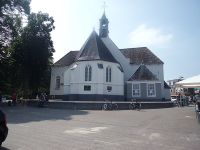Veenendaal (Dutch pronunciation: [ˈveːnə(n)ˌdaːl] (listen)) is a municipality and a town in central Netherlands, located in the province of Utrecht. Veenendaal is the only population centre within its administrative borders. The municipality had a population of 65,589 in 2019 and covers an area of 19.72 km2 (7.61 sq mi).
History
The original village was founded in the 16th century as a peat colony from which it got its name. Veen is the Dutch word for peat and daal for valley, so literally the name means "peat valley". In 1855 Veenendaal was hit by a flood. After that wool and tobacco industry became Veenendaal's largest source of income, roughly until World War II. Until just after World War II, Veenendaal remained a small community with only a few thousand residents. In the last fifty years, the town grew rapidly to the city with 64,000+ inhabitants of today.
Until the second half of the 20th century, Veenendaal was divided into two parts, a 'Gelders' and an 'Utrechts' part ('Gelders' comes from Gelderland and 'Utrechts' from Utrecht, both Dutch provinces). This is because in the first few centuries of the town's existence it was too small to be its own municipality. The southern half eventually became independent from Rhenen and Renswoude in 1795. The northern half separated from Ede in 1960.
In 1997 it was elected the greenest city in Europe and in 2004 of the Netherlands.
Like most Dutch cities, Veenendaal is well adapted to the high number of cyclists. A large network of bike paths make it convenient to cycle to various destinations and within the town, the bike is the most popular mean of transportation. In 2000 and 2020, Veenendaal was chosen as Fietsstad of the year, recognised as being the top city for cycling in the Netherlands.
